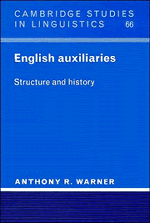Book contents
- Frontmatter
- Contents
- Dedication
- Preface
- List of abbreviations and references to primary texts
- 1 Basic properties of English auxiliaries
- 2 The morphosyntactic independence of auxiliaries
- 3 A formal interlude: the grammar of English auxiliaries
- 4 Distinguishing auxiliaries and verbs in early English
- 5 Identifying an ‘auxiliary group’ before Modern English: sentence-level syntax
- 6 Identifying an ‘auxiliary group’ before Modern English: further properties of ‘modals’
- 7 The developing modal semantics of early English ‘modals’
- 8 The status of modals and auxiliaries before Modern English
- 9 Auxiliaries in early Modern English and the rise of do
- 10 Conclusions
- Notes
- References
- Index of Scholars Cited
- General index
- Frontmatter
- Contents
- Dedication
- Preface
- List of abbreviations and references to primary texts
- 1 Basic properties of English auxiliaries
- 2 The morphosyntactic independence of auxiliaries
- 3 A formal interlude: the grammar of English auxiliaries
- 4 Distinguishing auxiliaries and verbs in early English
- 5 Identifying an ‘auxiliary group’ before Modern English: sentence-level syntax
- 6 Identifying an ‘auxiliary group’ before Modern English: further properties of ‘modals’
- 7 The developing modal semantics of early English ‘modals’
- 8 The status of modals and auxiliaries before Modern English
- 9 Auxiliaries in early Modern English and the rise of do
- 10 Conclusions
- Notes
- References
- Index of Scholars Cited
- General index
Summary
In this book I have tried to offer a relatively nonabstract account of major aspects of the grammar and history of English auxiliaries, not simply relying on reinterpretations of established data, but undertaking some further investigations as appropriate. I do not (of course) pretend to have provided a complete account, but have focused on specific topics which I am confident will need to be integrated within a more complete statement. My conclusions can be best presented under four headings.
Synchrony. I have argued for a new analysis of English auxiliaries, claiming that a series of their properties has a natural interpretation if they are analysed as a word class which is distinct from verbs particularly in that they are not subject to the regularities of verbal morphosyntax. What look like inflected forms are not, but (with the partial exception of being and having) are holistic or unitary items incorporating tense, mood or nonfinite categories lexically. This gives a rational account of the ordering of auxiliaries, of the absence of particular categories, of some curious facts about ellipsis, and of a range of other particular properties. It also accounts for the learnability of such properties. A formal analysis within the account of the lexicon given in HPSG was outlined, and a small set of lexical redundancy rules was shown to give a rather complete account of auxiliary constructions. It was more speculatively suggested that the distinct categoriality of auxiliaries in the case of modals (whose properties are central to the class) partly but crucially involves the interaction of subjectivity with their formal distinctness from verbs.
- Type
- Chapter
- Information
- English AuxiliariesStructure and History, pp. 236 - 239Publisher: Cambridge University PressPrint publication year: 1993



